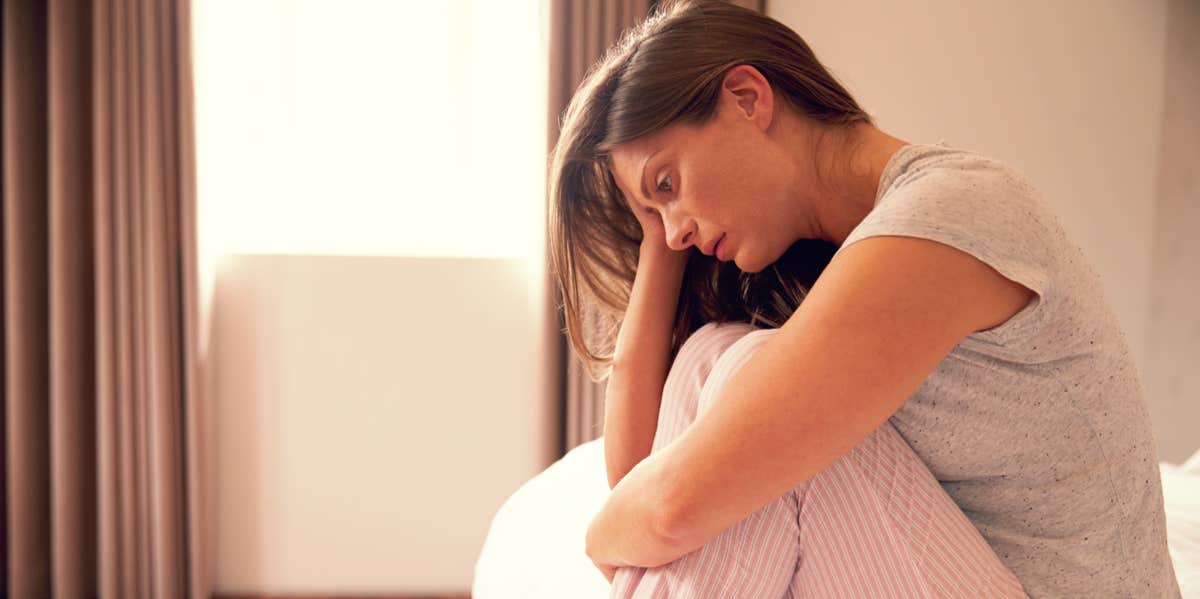I Miscarried And Everyone Wants Me To Focus On Gratitude
I’m learning to balance my grief and guilt with the knowledge that I love the children I have.
 Monkey Business Images / Shutterstock
Monkey Business Images / Shutterstock I chuck maternity jeans into a bag, cursing at other articles with cotton, stretchy waistbands. I yell at buttoned tops designed for growing children and, later, nursing. I bought them a few weeks before our baby’s heart stopped beating.
I want to hide these clothes from my sadness, from my children who didn’t know I was pregnant this time. I still need bigger clothes, though. My tummy, hips, and breasts have to learn that they no longer carry a child.
I didn’t realize how easily I had skated past the possibility of grief, how easily I had birthed three children. At the deepest times of pain, I want to curl up until my body and mind know how to get up and not cry again. Yes, I know I have children.
Yes, I can know that they are enough, but there is still so much to grieve. This is the conversation I have had with others. Friends need me to see my children and not get lost in what-ifs or emotions.
No chance to stay in bed with wine or Netflix. Maybe later, when I collapse in secret. There’s dinner, homework, family time with kids. There are squabbles to manage and laundry piles to delegate. My husband, capable and loving as he is, needs his partner to return from the swamps.
I don’t have time to grieve this loss when I’m parenting already-born, full-fledged, walking, snuggling, sniffling, hilarious, empathic children. The kids see my emotional fragility; they can’t handle too much darkness for too long.
And I can’t, either. But it sneaks up on me when I am suddenly aware of being by myself on an errand or in the shower where I sob, alone with my body. Before, with the pregnancies, I would nuzzle in, rub my tummy, and maybe speak or sing a few words. The suddenness in finally lying down and remembering my singular body is a long ache from what should have been.
Last New Year’s Eve, when we learned of the first miscarriage, I lived in self-blame when I wasn’t emotionally fragile with the kids, leaving the room if any word or movement set me off. Our youngest of three kids had kissed my belly daily; the loss was a blow to all of us. The squeaky five-year-old asked, “When I was a baby, did you lose me, too?”
This time, my son delivers a card to me while I am in bed: “Dear Mom. I hope you get better in a blink.”
Knowing that 1 in 7 pregnancies can end does not make it any easier — it’s more upsetting. Statistics contribute to the minimization of emotions. It seems a universal burden, but we push through, busy with tangles and braids, busy comforting our other babies.
I am a mother, but why couldn’t I keep mothering this child? Maybe it was my fault because of the apprehension that snuck in about nursing again, potty-training. I felt tired. How do I grapple with what happened and the joy that could have been?
This is not the nightmare of stillbirth; it is a life gone and a body vacated early on, but far enough to grieve. It is feeling guilt and hot shame. It is wondering through the night what I did wrong, but getting up to serve my kids breakfast.
Living through the first loss was raw and bleak. But I got up faster this time, having toughened my heart to the possibility of more loss. I could hide it. I needed to rest but also keep moving. I needed to not wash away. I baked. I wrote. While that sometimes felt like pressure to slip on a mask or hurry up and just be fine, maybe it helped me to get up.
Maybe other women feel this, too — this pressure to vocally take stock of our living kids. Family and friends need us to see our living kids and keep moving, lucky despite the grief and guilt in losing a baby inside.
My baby books are in a drawer, set down in deep darkness where my mother-heart sits. I wrote poems for them that sit in those drawers, too.
To open them is to pull away from the busyness of making dinner or fretting about my ten-year-old’s swollen glands and her upcoming birthday. Pulling these moments back into my lap is a sting. I can’t go there too often because I need my full self to function.
I am learning how this mother heals is in taking this time to pull away, but also to be gathered up and hugged. To be fed honey toast in bed by my kids, to receive cards that acknowledge something is gone, even if they don’t quite understand what it is. Grief is still here, but so is the gentle coaxing called love.
Melissa Uchiyama writes essays about food, culture, motherhood, and the craft of writing. She leads creative writing camps for young writers in Japan, where she resides. Her work has appeared in such places as The Washington Post, LA Review of Books, Brevity, The Japan Times, Taste, The Epoch Times, and various anthologies. Connect with Melissa on Twitter, @melibelletokyo.

